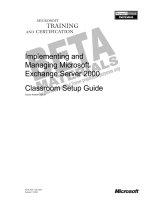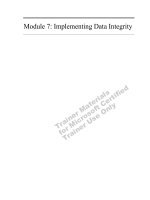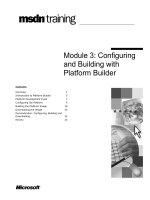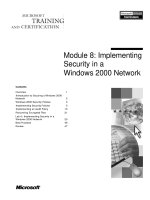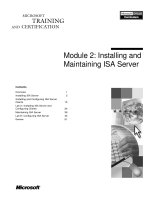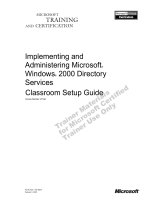Module 2-3 – Implementing and Verifying EIGRP pptx
Bạn đang xem bản rút gọn của tài liệu. Xem và tải ngay bản đầy đủ của tài liệu tại đây (588.95 KB, 26 trang )
© 2008 Cisco Systems, Inc. All rights reserved. Cisco ConfidentialBSCI
1
Configuring EIGRP
BSCI Module 2-3 – Implementing and Verifying EIGRP
© 2008 Cisco Systems, Inc. All rights reserved.BSCI
2
CCNP – BSCI Bachkhoa Networking Academy
Học viện mạng Bách Khoa - www.bkacad.com
Objectives
Upon completing this lesson, you will be able to
describe how to implement EIGRP routing. This ability
includes being able to meet these objectives:
–Describe the commands used in a basic EIGRP configuration
task
–Explain how to configure a router to use wildcard masks to
select the interfaces and networks that will participate in EIGRP
routing
–Configure the gateway of last resort or default route
–Verify that the router recognizes EIGRP neighbors and routes
–Verify EIGRP operations
© 2008 Cisco Systems, Inc. All rights reserved.BSCI
3
CCNP – BSCI Bachkhoa Networking Academy
Học viện mạng Bách Khoa - www.bkacad.com
Purpose of this Lesson
Coverage of topics new to the “EIGRP” module of BSCI.
What’s new in this module?
–Describe the commands used in a basic EIGRP configuration
task
–Explain how to configure a router to use wildcard masks to select
the interfaces and networks that will participate in EIGRP routing
–Configure the gateway of last resort or default route.
© 2008 Cisco Systems, Inc. All rights reserved.BSCI
4
CCNP – BSCI Bachkhoa Networking Academy
Học viện mạng Bách Khoa - www.bkacad.com
Configuring EIGRP
router eigrp autonomous-system-number
Defines EIGRP as the IP routing protocol.
All routers in the internetwork that must exchange EIGRP
routing updates must have the same autonomous system
number.
network network-number [wildcard-mask]
Identifies attached networks participating in EIGRP.
The wildcard-mask is an inverse mask used to
determine how to interpret the address. The mask has
wildcard bits, where 0 is a match and 1 is ―don’t care.‖
Router(config)#
Router(config-router)#
© 2008 Cisco Systems, Inc. All rights reserved.BSCI
5
CCNP – BSCI Bachkhoa Networking Academy
Học viện mạng Bách Khoa - www.bkacad.com
Configuring EIGRP (Cont.)
bandwidth kilobits
Defines the interface’s bandwidth for the purposes of
sending routing update traffic.
Router(config-if)#
© 2008 Cisco Systems, Inc. All rights reserved.BSCI
6
CCNP – BSCI Bachkhoa Networking Academy
Học viện mạng Bách Khoa - www.bkacad.com
Configuring EIGRP for IP
Network 192.168.1.0 is not configured on router A,
because it is not directly connected to router A.
© 2008 Cisco Systems, Inc. All rights reserved.BSCI
7
CCNP – BSCI Bachkhoa Networking Academy
Học viện mạng Bách Khoa - www.bkacad.com
Configuring EIGRP with IP (cont.)
Classful configuration example:
routerA(config)#router eigrp 109
routerA(config-router)#network 10.1.0.0
routerA(config-router)#network 10.4.0.0
routerA(config-router)#network 172.16.7.0
routerA(config-router)#network 172.16.2.0
Classless configuration example:
routerA(config)#router eigrp 109
routerA(config-router)#network 10.1.0.0 0.0.255.255
routerA(config-router)#network 10.4.0.0 0.0.255.255
routerA(config-router)#network 172.16.2.0 0.0.0.255
routerA(config-router)#network 172.16.7.0 0.0.0.255
© 2008 Cisco Systems, Inc. All rights reserved.BSCI
8
CCNP – BSCI Bachkhoa Networking Academy
Học viện mạng Bách Khoa - www.bkacad.com
Using the Wildcard Mask in EIGRP
© 2008 Cisco Systems, Inc. All rights reserved.BSCI
9
CCNP – BSCI Bachkhoa Networking Academy
Học viện mạng Bách Khoa - www.bkacad.com
EIGRP Default Routes—Configuring
Step 1: Create default-route
–R(config)#ip route 0.0.0.0 0.0.0.0 exit-INT or next-hop
Step 2: Propagating a default route
Option 1:
–R(config)#ip default-network a.b.c.d
–R(config)#router eigrp 1
–R(config-router)#network a.b.c.d
–R(config-router)#passive-interface
Option 2: Redistribute static
Option 3: summary-address eigrp as-number 0.0.0.0 0.0.0.0
© 2008 Cisco Systems, Inc. All rights reserved.BSCI
10
CCNP – BSCI Bachkhoa Networking Academy
Học viện mạng Bách Khoa - www.bkacad.com
Using and Configuring the ip default-network
command for EIGRP
© 2008 Cisco Systems, Inc. All rights reserved.BSCI
11
CCNP – BSCI Bachkhoa Networking Academy
Học viện mạng Bách Khoa - www.bkacad.com
Using and Configuring the ip default-network
command for EIGRP
Note
When you configure the ip default-network command,
a static route (the ip route command) is generated in
the router configuration. However, the Cisco IOS
software does not display a message to indicate this.
The entry appears as a static route in the routing table
of the router in which the command is configured, as
can be seen in the router A configuration and routing
table in the figure. This entry can be confusing if you
want to remove the default network. The configuration
must be removed with the no ip default-network
network command.
© 2008 Cisco Systems, Inc. All rights reserved.BSCI
12
CCNP – BSCI Bachkhoa Networking Academy
Học viện mạng Bách Khoa - www.bkacad.com
Example R1 EIGRP Configuration
© 2008 Cisco Systems, Inc. All rights reserved.BSCI
13
CCNP – BSCI Bachkhoa Networking Academy
Học viện mạng Bách Khoa - www.bkacad.com
R2 EIGRP Configuration
<output omitted>
interface FastEthernet0/0
ip address 172.17.2.2 255.255.255.0
<output omitted>
interface Serial0/0/1
bandwidth 64
ip address 192.168.1.102 255.255.255.224
<output omitted>
router eigrp 100
network 172.17.2.0 0.0.0.255
network 192.168.1.0
© 2008 Cisco Systems, Inc. All rights reserved.BSCI
14
CCNP – BSCI Bachkhoa Networking Academy
Học viện mạng Bách Khoa - www.bkacad.com
Verifying EIGRP: show ip eigrp neighbors
R1#show ip eigrp neighbors
IP-EIGRP neighbors for process 100
H Address Interface Hold Uptime SRTT RTO Q Seq
(sec) (ms) Cnt Num
0 192.168.1.102 Se0/0/1 10 00:07:22 10 2280 0 5
R1#
H: It records the order in which the neighbors were learned.
SRTT: Average number of milliseconds it takes for an EIGRP packet to
be sent to this neighbor and for the local router to receive an
acknowledgment of that packet.
RTO (retransmission timeout): Amount of time, in milliseconds, that
the router waits for an acknowledgment before retransmitting a reliable
packet from the retransmission queue to a neighbor
Q Cnt (queue count): Number of packets waiting in the queue to be
sent out
Seq Num: Sequence number of the last update, query, or reply packet
that was received from this neighbor
© 2008 Cisco Systems, Inc. All rights reserved.BSCI
15
CCNP – BSCI Bachkhoa Networking Academy
Học viện mạng Bách Khoa - www.bkacad.com
Verifying EIGRP: show ip route
eigrp
R1#show ip route eigrp
D 172.17.0.0/16 [90/40514560] via 192.168.1.102, 00:07:01, Serial0/0/1
172.16.0.0/16 is variably subnetted, 2 subnets, 2 masks
D 172.16.0.0/16 is a summary, 00:05:13, Null0
192.168.1.0/24 is variably subnetted, 2 subnets, 2 masks
D 192.168.1.0/24 is a summary, 00:05:13, Null0
R1#show ip route
<output omitted>
Gateway of last resort is not set
D 172.17.0.0/16 [90/40514560] via 192.168.1.102, 00:06:55, Serial0/0/1
172.16.0.0/16 is variably subnetted, 2 subnets, 2 masks
D 172.16.0.0/16 is a summary, 00:05:07, Null0
C 172.16.1.0/24 is directly connected, FastEthernet0/0
192.168.1.0/24 is variably subnetted, 2 subnets, 2 masks
C 192.168.1.96/27 is directly connected, Serial0/0/1
D 192.168.1.0/24 is a summary, 00:05:07, Null0
© 2008 Cisco Systems, Inc. All rights reserved.BSCI
16
CCNP – BSCI Bachkhoa Networking Academy
Học viện mạng Bách Khoa - www.bkacad.com
Verifying EIGRP: show ip protocols
R1#show ip protocols
Routing Protocol is "eigrp 100"
Outgoing update filter list for all interfaces is not set
Incoming update filter list for all interfaces is not set
Default networks flagged in outgoing updates
Default networks accepted from incoming updates
EIGRP metric weight K1=1, K2=0, K3=1, K4=0, K5=0
EIGRP maximum hopcount 100
EIGRP maximum metric variance 1
Redistributing: eigrp 100
EIGRP NSF-aware route hold timer is 240s
<output omitted>
Maximum path: 4
Routing for Networks:
172.16.1.0/24
192.168.1.0
Routing Information Sources:
Gateway Distance Last Update
(this router) 90 00:09:38
Gateway Distance Last Update
192.168.1.102 90 00:09:40
Distance: internal 90 external 170
© 2008 Cisco Systems, Inc. All rights reserved.BSCI
17
CCNP – BSCI Bachkhoa Networking Academy
Học viện mạng Bách Khoa - www.bkacad.com
Verifying EIGRP: show ip eigrp
interfaces
R1#show ip eigrp interfaces
IP-EIGRP interfaces for process 100
Xmit Queue Mean Pacing Time Multicast Pending
Interface Peers Un/Reliable SRTT Un/Reliable Flow Timer Routes
Fa0/0 0 0/0 0 0/10 0 0
Se0/0/1 1 0/0 10 10/380 424 0
•The show ip eigrp interfaces command displays information about
interfaces configured for EIGRP. This output includes the following key
elements:
•Interface: Interface over which EIGRP is configured
•Peers: Number of directly connected EIGRP neighbors
•Xmit Queue Un/Reliable: Number of packets remaining in the Unreliable
and Reliable transmit queues
•Mean SRTT: Mean smoothed round trip time (SRTT) interval, in milliseconds
•Pacing Time Un/Reliable: Pacing time used to determine when EIGRP
packets should be sent out the interface (unreliable and reliable packets)
•Multicast Flow Timer: Maximum number of seconds in which the router will
send multicast EIGRP packets
•Pending Routes: Number of routes in the packets in the transmit queue
waiting to be sent
© 2008 Cisco Systems, Inc. All rights reserved.BSCI
18
CCNP – BSCI Bachkhoa Networking Academy
Học viện mạng Bách Khoa - www.bkacad.com
Verifying EIGRP: show ip eigrp
topology
R1#show ip eigrp topology
IP-EIGRP Topology Table for AS(100)/ID(192.168.1.101)
Codes: P - Passive, A - Active, U - Update, Q - Query, R - Reply,
r - reply Status, s - sia Status
P 192.168.1.96/27, 1 successors, FD is 40512000
via Connected, Serial0/0/1
P 192.168.1.0/24, 1 successors, FD is 40512000
via Summary (40512000/0), Null0
P 172.16.0.0/16, 1 successors, FD is 28160
via Summary (28160/0), Null0
P 172.16.1.0/24, 1 successors, FD is 28160
via Connected, FastEthernet0/0
P 172.17.0.0/16, 1 successors, FD is 40514560
via 192.168.1.102 (40514560/28160), Serial0/0/1
•Update (U): This code applies if a network is being updated (placed in an update packet). This code also
applies if the router is waiting for an acknowledgment for this update packet.
•Query (Q): This code applies if there is an outstanding query packet for this network other than being in the
active state. This code also applies if the router is waiting for an acknowledgment for a query packet.
•Reply (R): This code applies if the router is generating a reply for this network or is waiting for an
acknowledgment for the reply packet.
•Stuck-in-active (SIA) status: This code signifies an EIGRP convergence problem for the network with which
it is associated.
•The number of successors available for a route is indicated in the command output. In this example, all
networks have one successor. If there were equal-cost paths to the same network, a maximum of six paths
would be shown. The number of successors corresponds to the number of best routes with equal cost.
© 2008 Cisco Systems, Inc. All rights reserved.BSCI
19
CCNP – BSCI Bachkhoa Networking Academy
Học viện mạng Bách Khoa - www.bkacad.com
Verifying EIGRP: show ip eigrp
traffic
R1#show ip eigrp traffic
IP-EIGRP Traffic Statistics for AS 100
Hellos sent/received: 429/192
Updates sent/received: 4/4
Queries sent/received: 1/0
Replies sent/received: 0/1
Acks sent/received: 4/3
Input queue high water mark 1, 0 drops
SIA-Queries sent/received: 0/0
SIA-Replies sent/received: 0/0
Hello Process ID: 113
PDM Process ID: 73
© 2008 Cisco Systems, Inc. All rights reserved.BSCI
20
CCNP – BSCI Bachkhoa Networking Academy
Học viện mạng Bách Khoa - www.bkacad.com
Summary
The configuration commands for basic EIGRP include:
•router eigrp autonomous-system
•network network-number [wildcard-mask]
•bandwidth kilobits
The optional wildcard-mask parameter in the network
command is an inverse mask used to determine how to
interpret the network-number. A wildcard bit of 0 is a
match and of 1 is “don’t care”.
Create and advertise a default route in an EIGRP
autonomous system with the ip default-network
network-number command.
© 2008 Cisco Systems, Inc. All rights reserved.BSCI
21
CCNP – BSCI Bachkhoa Networking Academy
Học viện mạng Bách Khoa - www.bkacad.com
Summary (cont.)
Use the show ip eigrp neighbors command to
verify that the router recognizes its neighbors. Use the
show ip route eigrp command to verify that the
router recognizes routes from its neighbors.
Use the show ip protocols, show ip eigrp
interfaces, show ip eigrp neighbors, show
ip eigrp topology, and show ip eigrp
traffic commands to verify EIGRP operations.
–.
© 2008 Cisco Systems, Inc. All rights reserved.BSCI
22
CCNP – BSCI Bachkhoa Networking Academy
Học viện mạng Bách Khoa - www.bkacad.com
Activity
Create a simple network using EIGRP as your routing
protocol. These steps were discussed at the beginning
of this module.
Verify your connections by running the show
commands discussed in the module:
–show ip protocols, show ip eigrp interfaces,
show ip eigrp neighbors, show ip eigrp topology,
and show ip eigrp traffic
Reflection: Are your routes displayed correctly in the
routing table and identified as both directly connected
or EIGRP?
© 2008 Cisco Systems, Inc. All rights reserved.BSCI
23
CCNP – BSCI Bachkhoa Networking Academy
Học viện mạng Bách Khoa - www.bkacad.com
Self Check
Which show command verifies the router can recognize
its neighbors?
Show ip route eigrp has what function?
What command establishes EIGRP as the routing
protocol?
Identify the command to create and advertise a default
route in an EIGRP autonomous system.
© 2008 Cisco Systems, Inc. All rights reserved.BSCI
24
CCNP – BSCI Bachkhoa Networking Academy
Học viện mạng Bách Khoa - www.bkacad.com
Resources
Configuring EIGRP
/>ps1828/products_configuration_guide_chapter0918
6a00800ca56e.html
/>ch_note09186a008009405c.shtml
/>28/products_command_reference_chapter09186a0080
0ca5a9.html
/>ch_note09186a0080093f07.shtml
© 2008 Cisco Systems, Inc. All rights reserved.BSCI
25
CCNP – BSCI Bachkhoa Networking Academy
Học viện mạng Bách Khoa - www.bkacad.com
Q and A
